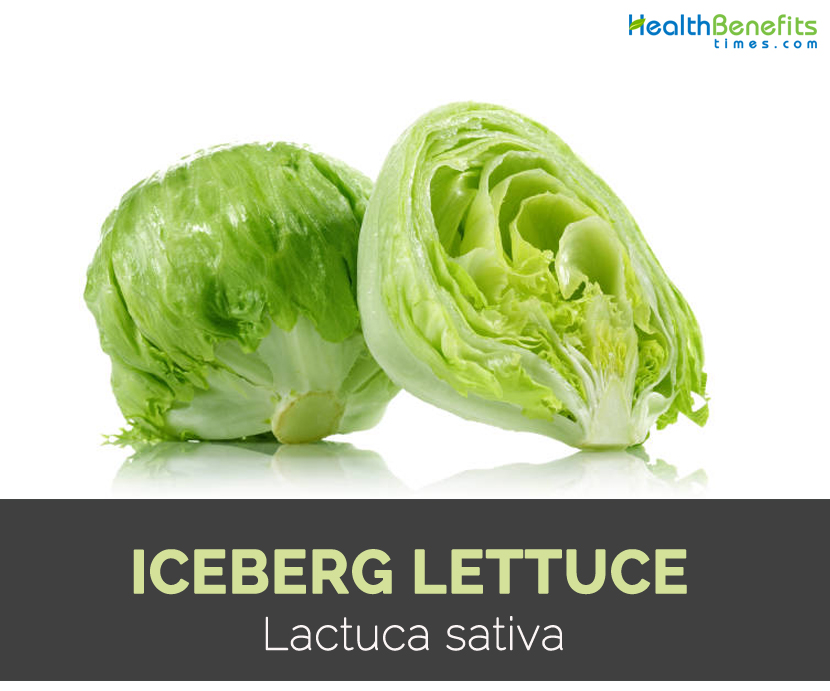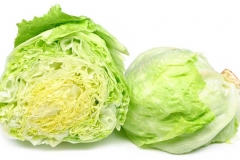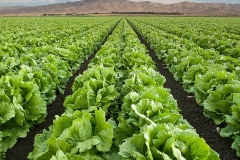Health Benefits of Iceberg Lettuce
- Lose weight
Iceberg lettuce has high content of water and low calories that helps to promote weight loss.
- Health improvement
The lettuce offers high content of Vitamin A, a crucial vitamin for healthy eyes and also growth or development of bones. Also it boosts immune system.
- Prevent birth defects
Iceberg lettuce contains desirable amounts of folate, must for women during pregnancy in order to avoid the chances of birth defects such as anencephaly and spina bifida. Also lowers the chances of neural tube defects.
- Blood clots
Vitamin K found in Iceberg lettuce enables the production of protein which is required for blood clotting.
- Combat diseases
Folate in Iceberg lettuce helps to prevent health ailments that include depression, folate deficiency and chronic health problems.
- Benefits heart
Potassium detected in iceberg lettuce maintains the blood pressure as well as heart rate that overall maintains heart health. It provides the required nutrients for hardening arteries and dietary fiber has a role in regulating the flow of blood to the heart.
- Boost immune system
Iceberg lettuce encompasses fundamental minerals: magnesium, manganese, iron, potassium, calcium and phosphorus that bolster body’s immunity. It halts the activities of free radicals and forbids viral infections and other diseases.
- Healthy body
Iceberg lettuce accommodates Vitamin A and its activities are associated with stronger bones, healthy eyes and intensify immune system.
- Prevention of anemia
Minerals like iron are involved in the formation of red blood cells. It is accountable for delivering oxygen to various parts of the body. The favorable presence of red blood cells in the body helps to prevent anemia.
- Supports digestion
It assists food digestion in the body with disintegration of heavy carbohydrates and proteins. It enables proper functioning of stomach. It smoothen the bowel movements and cures constipation as well as acid reflux.
- Sleep quality
Intake of Iceberg lettuce relaxes eyes and body and provides sound sleep. Insomnia patients could be benefited with an addition of iceberg lettuce to the diet.
https://www.youtube.com/watch?v=FgGvtWSduEY
How to select
Select a lettuce with firm head with no discoloration areas or slime. Store it in a chilled section in refrigerator to prevent it from wilt and becoming bitter.
Culinary uses
- Make a salad by drizzling lemon juice and olive oil to iceberg lettuce. This lettuce makes a perfect base for salads.
- As a meal, serve steamed lettuce with brown rice and black eyed peas.
- Use steamed lettuce as a filling in sushi rolls.
- Saute iceberg lettuce with garlic, tofu and crushed chili peppers.
- Use it in burgers and sandwiches.
- Add it to stir fries and soups to enhance the flavor.
- Mix it with other greens, grilled chicken, green grapes and light raspberry vinaigrette.
- Add it to salads and spring rolls.
- Use it with green beans, garden peas and seafood such as shrimp and prawns.
Side effects
- Made up of water, iceberg lettuce is harmful only when consumed in excess.
- As it contains beta-carotene, its excessive consumption results in carotenodermia.
- Also iceberg lettuce has high content of pesticides which are found to be harmful for the health.
References:
https://www.heirloomgardener.com/plant-profiles/edible/the-history-of-lettuce-zm0z18szphe
https://www.tarladalal.com/glossary-iceberg-lettuce-499i
https://www.healthline.com/health/food-nutrition/iceberg-lettuce#takeaway
https://www.lybrate.com/topic/benefits-of-iceberg-lettuce-and-its-side-effects
https://www.organicfacts.net/health-benefits/vegetable/iceberg-lettuce.html
https://www.lybrate.com/topic/benefits-of-iceberg-lettuce-and-its-side-effects
http://www.plantnames.unimelb.edu.au/Sorting/Lactuca.html
https://www.itis.gov/servlet/SingleRpt/SingleRpt?search_topic=TSN&search_value=36607#null
Comments
| Iceberg Lettuce Quick Facts | |
|---|---|
| Name: | Iceberg Lettuce |
| Scientific Name: | Lactuca sativa |
| Calories | 10 Kcal./cup |
| Major nutrients | Vitamin K (14.50%) Vitamin B9 (5.25%) Manganese (3.91%) Iron (3.75%) Vitamin A (2.57%) |
| Name | Iceberg Lettuce |
|---|---|
| Scientific Name | Lactuca sativa |
| Leaves | Light green to white |
| Flavor | Mild |
| Major Nutritions | Vitamin K (phylloquinone) 17.4 µg (14.50%) Vitamin B9 (Folate) 21 µg (5.25%) Manganese, Mn 0.09 mg (3.91%) Iron, Fe 0.3 mg (3.75%) Vitamin A, RAE 18 µg (2.57%) Vitamin B1 (Thiamin) 0.03 mg (2.50%) Total dietary Fiber 0.9 g (2.37%) Vitamin B6 (Pyridoxine) 0.03 mg (2.31%) Vitamin C (Ascorbic acid) 2 mg (2.22%) Potassium, K 102 mg (2.17%) |
| Calories in 1 cup shredded (72 g) | 10 Kcal. |






